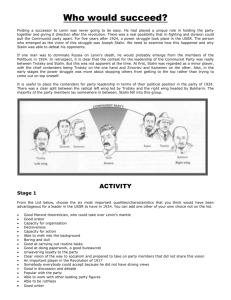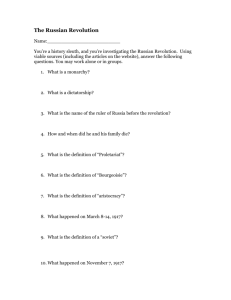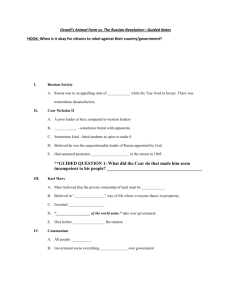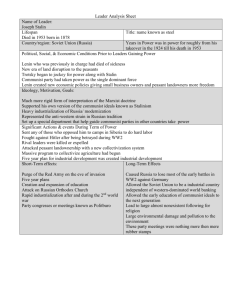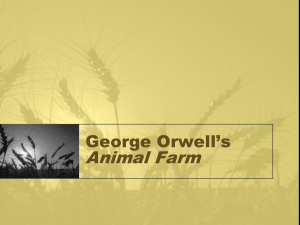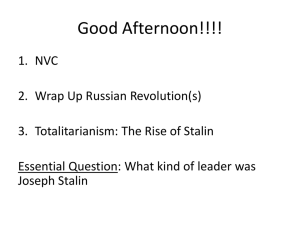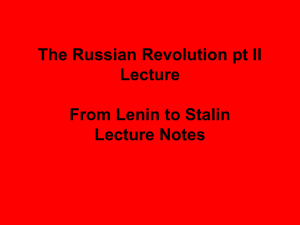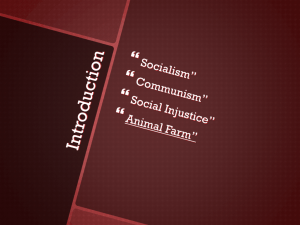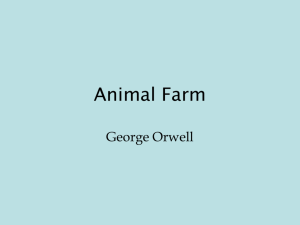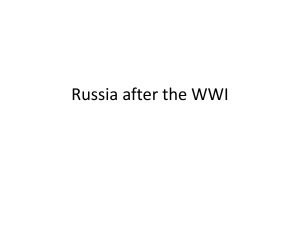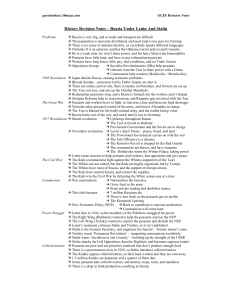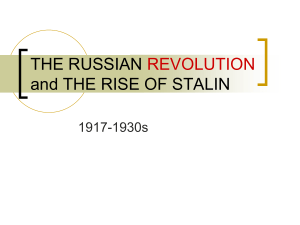Treaty of Rapallo
advertisement
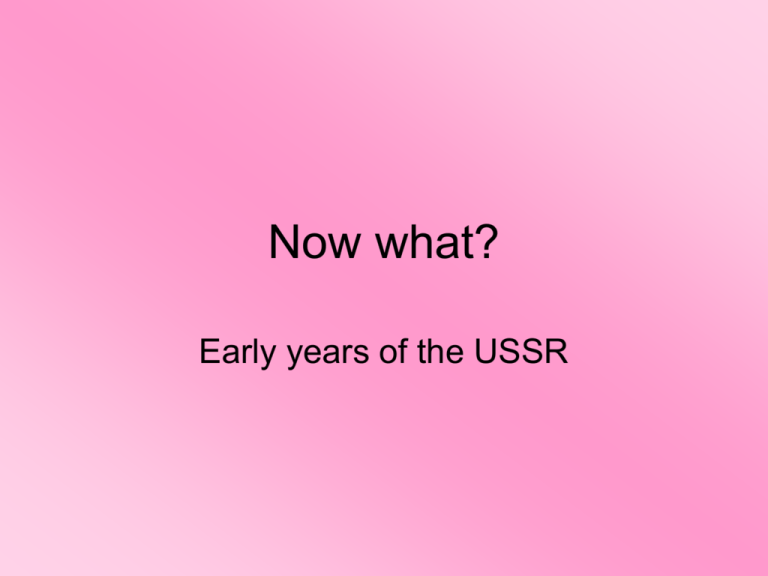
Now what? Early years of the USSR We got problems…. • Nationalization of land • Extension of wide-spread economic problems • 5 million dead starvation • peasant revolts put down by military • What to do?? New Economic Policy--1921 • Growing hatred of Bolsheviks by unions & workers • Temporary “retreat” to limited capitalism – Compromise system • • • • Not widespread Peasants can sell surplus crops/goods TAXED—peasants bear brunt (as always) “taxation in kind” -- successful Lenin’s policies • Govt is assigned control over all – In charge of all materials of life • Factories –workers committees (overseers) – Ensure production numbers (quotas) • Appropriated funds – Bank accounts • Abolished court system—install People’s Court • No titles of nobility Russian Orthodox Church • No more religious instruction • Churches turned into museums or storage facilities • All religion derided • Marriage—from religious to civil • Simpler to marry & divorce (postcards) Cheka • Extraordinary Commission for Combating Counterrevolution and Sabotage • 1. To investigate and liquidate all attempts or actions connected with counterrevolution or sabotage, no matter from whom they may come, throughout Russia. • 2. The handing over for trial by Revolutionary Tribunal of all saboteurs and counter-revolutionaries, and the elaboration of measures to fight them Feliks Dzerzhinsky • “Bread War.” • Elimination of the Kulaks (“wealthy” peasant farmers) • Not only were individual peasants executed but entire families and whole villages as well. Foreign Policy • Georgi Chicherin 1918-1930 • #1 objective—international recognition as legitimate government & nation • deep concerns about communism – GB & USA (USA held out longest--1933) – Rhetoric—international revolution – “Workers of the World Unite” – “We will bury you!” • Germany recognized first—outcast nation WWI – Treaty of Rapallo —economic & political reasons – Cancel mutual debts & territorial claims against the other – Lasted until Adolf Maxim Litvinov • Appointed by Lenin as ambassador to Britian • Arrested for prisoner exchange • “Roaming Ambassador” • Largely responsible for international recognition • Harpo Marx & FDR – Groucho’s bro Central Committee of the Communist Party • • • • Politburo --- Orgburo Set up within the central committee Need to make more rigid decisions 2 bodies—subordinate to central cmte Politburo • 5 members –Lenin –Trotsky –Stalin • Policy-making body Orgburo --- Secretariat • • • • • Implement policies a LOT of POWER Check up and REGULATE Determine promotions Assign jobs dictatorships • We are being run by an elite dictatorship of the proletariat and the Communist Party Vladimir Lenin • Disillusioned with masses • No kind of freedom is more important than the central idea of Bolshevism • Masses—low cultural level • Soviets should not have any say in determining Party politics • 1918—BolsheviksCommunists (name) NEPmen • New Economic Policy men • Those who profited by some allowance of capitalism • Became small BUSINESSMEN—profited due to limited capitalism KULAKS • peasants who used extra surplusescapitalists • Wealthy peasants • Trotskyopposed NEPgave too many concessions to peasants • Believed in WORLD revolution • “truer” socialism …time marches on… • Mid 1920s—USSR on way to full capitalism – Consumer goods for people • Caused dissension in Party • 1924—Vladimir Lenin dead – Party wo/rudder power vacuum Post-Lenin • Power vacuum & struggle for power • Left—Trotsky –WORLD REVOLUTION – stop NEP • Right—Nicholas Bukharin – World Revolution & NEP • Center—Josef Stalin – Russia as EXAMPLE of socialism for the WORLD – world revolution not as prominent (lip service) – most effort needed to transform Russia Trotsky • World revolution~~SOCIALISM • COMINTERN • Communist international – Promote world-wide communism • Propaganda • Infiltration – stir up trouble Trotsky • NEP gave too many concessions to peasants • peasants should be limited (thumb!) • More cosmopolitan (exile experiences) Josef Stalin • Iosif Djugashvili • “Man of Steel” • Georgian—most of life in Russia • Not exposed to outside • RUSSIAN! – By choice Stalin • • • • • Radical convert NEP? No standing one way or other Could be seen as against When in power—5-year Plans Goal: transform Russia into socialist example for World • Always Russia #1 Stalin • Attitude of Russian Communism • Marxism-Leninism – Pseudoscience – Pseudoreligion (more later) • Comprehensive—Russian style • Ruthlessly intolerant • Had ALL answers for EVERYTHING!! – His way—there ain’t no highway! Stalin • People act the way they do because of their class • change system to eleminate “badness” • Pseudoreligion – doctrine of “salvation” • Represented interests of masses (yeah, right!) – Messiah – proletariat – Paradise – classless society – Church – Communist Party – Scripture – Marx & Lenin Stalin • Gained eventual power – Played others against each other (Trotsky v Bukharin) • Trotsky—1st to fall – Lost military leadership – Outlawed by Central Committee – Condemned as “factionalist” (counterrevolutionary) – Not present @ Lenin’s funeral (bad!) – Refused to fight for position—arrogant – Exiled OUT – Assassinated – Mexico City (icepick) Kamenev, STALIN, Zinoviev • Triumvirate? Didn’t last… • Stalin – Controlled patronage in Party – Recruited people loyal to HIM – Called himself “Lenin’s right-hand man” • NOT – Purges—kill off “old guard” followers of Lenin • no opposition – 1936-1939 BLOODY • Secret police—NKVD—hand-picked Stalin: Man of Steel
